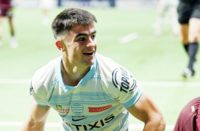 Now comes the reckoning. Forget about all the window-dressing surrounding the good intentions of Stuart Lancaster's young hopefuls and cut to the harsh reality of autumn Test rugby, and England's place in the world order a decade after Sir Clive Woodward's squad returned triumphant to these shores bringing ‘Bill' – a.k.a. the William Webb Ellis trophy – with them.
Now comes the reckoning. Forget about all the window-dressing surrounding the good intentions of Stuart Lancaster's young hopefuls and cut to the harsh reality of autumn Test rugby, and England's place in the world order a decade after Sir Clive Woodward's squad returned triumphant to these shores bringing ‘Bill' – a.k.a. the William Webb Ellis trophy – with them.
Harsh, because the Wallabies, Springboks and All Blacks who are heading this way don't give a hoot about how many caps Stuart Lancaster's side has, or what his injury problems are, or any of the other learning curve paraphernalia that surrounds a team in a renewal phase. All they care about is that it's England, a rugby country they automatically label as arrogant, not least in terms of exaggerating the prowess of their own players, none of whom they believe would make a current World XV – or even a World 2nd XV.
Nothing would make them happier than to ram that message home by beating England in front of their own fans at Twickenham – and whether Lancaster, his coaches, or his side, are inexperienced has no relevance. Another ‘W' against the Poms is all that matters, especially if it knocks them off balance along the road to the 2015 World Cup.
The Southern Hemisphere big three have been through their own rebuilding phases in recent history, and in their book it is no excuse for failing to produce a team that can deliver on the big stage. If England cannot get their act together at elite level to produce world-class sides on a consistent basis, then that is their problem, and it elicits no sympathy.
That hard-bitten outlook is difficult to quarrel with, whereas the less rigourous mantra offered by some Red Rose supporters that, “given time, experience, and plenty of encouragement Lancaster's boys will come good for the 2015 World Cup”, is not. They cite the 14–14 draw in the third Test with the Springboks as evidence of rapid progress, augmenting the runners-up status in the last Six Nations. The counterpoint is that England have the resources, physical and financial, and a big enough bank of rugby knowledge, to be as competitive as anyone.
The fact that they have not managed to harness them to win anything bar a single Six Nations title in the decade since becoming world champions is a damning indictment of the England elite system, especially as the Six Nations sides are constantly second best to their SANZAR opponents.
Lancaster's assistant coaches, Graham Rowntree (forwards), Andy Farrell (defence) and Mike Catt (attack), say that they are excited by the prospect in this autumn series of taking on the three teams ahead of them in the world rankings. This was emphasised at the 32-man squad announcement at the London head office of autumn series sponsors, QBE, on Thursday, when they were unrelentingly positive in their enthusiasm and their message that England have players with the talent, and the work ethic, to give the Southern Hemisphere trio a warm welcome.

This included a fanfare for the impressive young Saracens loose head, Mako Vunipola, which meant he has no chance of sneaking under the southern radar after replacing Alex Corbisiero. “I have no doubt he'll make his name this autumn…I'm looking for a fault in his game, and I can't find one at the moment,” Rowntree said.
The coaches were also unrelenting in telling us they are still relative Test novices, a work in progress. However, the depleted Wallaby side that halted New Zealand's tilt at a world-record winning run in Brisbane last weekend has a similar number of caps to Lancaster's England, and it is questionable whether a team that has 300 caps – as England will this autumn – should still be attempting to play the inexperience card. For the record, the 1987 New Zealand World Cup-winning side had 109 caps, their 1991 Australian counterparts had 304, and in 1995 when South Africa were crowned world champions for the first time they had 127.
Woodward prioritised the autumn series, putting it ahead of the Six Nations because of the quality of the opposition, and his belief that if England were to win the World Cup they had to target the Southern Hemisphere teams, who were their biggest rivals for that prize. History proved Woodward to be right, and his record of three unbeaten years against New Zealand, South Africa, and Australia in the build-up to the 2003 tournament is unprecedented.
Going into this series that landscape is unrecognisable, with England having lost 11 Tests out of their last 14 to the Southern Hemisphere nations at Twickenham. This was highlighted, jarringly, at the squad launch when Chris Robshaw, the unconfirmed England captain and QBE ambassador, provided the commentary to a short film of successes against the Southern Hemisphere big three – with all the footage coming from the Woodward era.
Ten years on and the signposts point in the direction of English rugby heading down the road to a 1966 World Cup soccer scenario of serial non-achievement, but in a sport with a much smaller number of elite international teams. As for Woodward, he's available, but as the RFU's chief executive, Ian Ritchie, put it a couple of weeks ago, “there is no vacancy”.
The paradox is that this autumn the decision of Ritchie, and Rob Andrew, his operations director, to back Lancaster to be Martin Johnson's permanent successor, will come under intense scrutiny. Lancaster does not like being cast as a novice coach, but a non-existent track record at Test level before the 2012 Six Nations makes that inevitable, and the only way he can change it – and justify the leap of faith made by Ritchie and Andrew – is by beating Fiji, and winning two of the three Tests against Australia, South Africa and New Zealand.
If Lancaster comes through that trial by fire intact then his credentials will be boosted in the same way as Woodward's were after 1999, but if England make no advance on being brave losers with clear limitations, as they were in South Africa four months ago, the pressure on him will mount.
The new slant is that England's coaching think-tank is moving towards New Zealand's highly mobile raider-style rugby, and although they are cagey about the detail Catt revealed that they are trying to instil the tactical know-how to take the next step this autumn. The 70-cap former World Cup-winner talked about the importance of having players, “who can see the game unfolding in the moment and adapting”, and hinted at the size of the challenge with this reference to the scrum-halves.
“Look at Danny Care, Lee Dickson and Ben Youngs, who are pretty well on the front foot every weekend with the pack of forwards they've got. So, what happens when they come up against neutral or even negative gain-lines (in international rugby)? These are the things I've got to put in place, because they don't come up against these scenarios. I've got to say, ‘we need to do this, or do that'. That's my role – being able to see what's happening on the pitch and transmitting it to them.”
Catt confirms, however, that there is nothing too radical in England's approach. “Your key decison makers are still at 9 and 10, with another floating play-maker somewhere else in the backline.”
For Catt to use the scrum-halves, a clear area of England strength, as an illustration of where they have to get tactically smarter, begs even more questions about fly-half, a position that is fast becoming a problem. The Toby Flood intercept which sparked Leicester's late 10-minute burst against the Ospreys last weekend notwithstanding, the Tigers fly-half has had a mixed season so far in terms of reading and controlling matches for his club, despite having 50 caps in the bag.
The only other No.10 in the squad is Owen Farrell, who has played mainly at centre for Saracens this season due to the presence of Charlie Hodgson, with the England retiree currently playing out of his skin and outshining every other fly-half in Europe bar that other retired Red Rose legend, Toulon's Jonny Wilkinson. The upshot is that Farrell, who needed time in the fly-half shirt in order to mend the option-taking defects that surfaced in South Africa, has not had it.

However, instead of picking a third fly-half on the basis that Farrell also covers both centre positions at Saracens, Lancaster has opted for the luxury of five centres (Brad Barritt, Jordan Turner-Hall, Anthony Allen, Manu Tuilagi and Jonathan Joseph). This means no space for the rapid Freddie Burns, who has given Gloucester shape and sharpness, or George Ford, the young general who is Flood's rival at Welford Road and Vunipola's former England U20 team-mate.
It is a perplexing call given that a fly-half who can offer a blend of vision and precision, like Dan Carter, is so elemental to the multi-purpose All Black game that England want to emulate. What's more Catt is convinced that England's key strike runner, Manu Tuilagi is capable of far greater flexibility than he has shown so far.
“He is playing exceptionally well whether he is at 12 or 13. We will discuss it with him and the players around him. It is about getting the ball in his hands, he is one of our main ball carriers and he is a big physical man and getting the ball to him on a regular basis causes chaos for defences. You could swap him around in certain plays and it doesn't really matter what number he has on his back, it is about using him effectively and efficiently.
He adds: “Manu is on form and he is a vital cog in where we need to go. What I have seen of him passing – he is exceptionally good at it – we have got to put him in positions where he can use those abilities. International rugby is a big, physical game – the guys he comes up against are big, physical guys as well and you can't just have one attribute. From what I have seen working with him he has the ability to do whatever you want.”
To get the best out of Tuilagi, and the team as a whole, someone is going to have to pull Catt's attacking vision together, taking it from the white board onto the pitch. So far, England's key decision makers have been slow in coming forward – and, unless they do, England's attacking game could be blowing in the autumn winds.
2 Comments
Leave a Comment
You must be logged in to post a comment.



























And just who exactly would the big three be? Fiji, Tonga and Samoa? Currently the six best teams in the world in order would be NZ, RSA, Pumas, France and Samoa. Tonga and Fiji would not be far behind, given a level playing field with the decent treatment by European clubs and referees.
Pingback: youtube automation niches